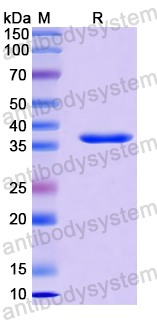Catalog No.
YHH38201
Expression system
E. coli
Species
Homo sapiens (Human)
Protein length
Asn916-Val1208
Predicted molecular weight
36.67 kDa
Nature
Recombinant
Endotoxin level
Please contact with the lab for this information.
Purity
>90% as determined by SDS-PAGE.
Accession
Q16827
Applications
ELISA, Immunogen, SDS-PAGE, WB, Bioactivity testing in progress
Form
Lyophilized
Storage buffer
Lyophilized from a solution in PBS pH 7.4, 0.02% NLS, 1mM EDTA, 4% Trehalose, 1% Mannitol.
Reconstitution
Reconstitute in sterile water for a stock solution. A copy of datasheet will be provided with the products, please refer to it for details.
Shipping
In general, proteins are provided as lyophilized powder/frozen liquid. They are shipped out with dry ice/blue ice unless customers require otherwise.
Stability and Storage
Use a manual defrost freezer and avoid repeated freeze thaw cycles. Store at 2 to 8°C for frequent use. Store at -20 to -80°C for twelve months from the date of receipt.
Alternative Names
PTPRO, PTP-U2, PTPase U2, Glomerular epithelial protein 1, Receptor-type tyrosine-protein phosphatase O, R-PTP-O, PTPU2, GLEPP1, Protein tyrosine phosphatase U2
A genome-wide association study on rumination time in first-lactation dairy cattle., PMID:40306420
PTPRO represses breast cancer lung metastasis by inhibiting the JAK2-YAP axis., PMID:40016288
Protein tyrosine phosphatase receptor type O serves as a key regulator of insulin resistance-induced α-synuclein aggregation in Parkinson's disease., PMID:39276174
Identification of Sweetness Preference-Related Single-Nucleotide Polymorphisms for Polygenic Risk Scores Associated with Obesity., PMID:39275286
Targeting undruggable phosphatase overcomes trastuzumab resistance by inhibiting multi-oncogenic kinases., PMID:39094301
PTPRO inhibits LPS-induced apoptosis in alveolar epithelial cells., PMID:38735138
PTPRO inhibition ameliorates spinal cord injury through shifting microglial M1/M2 polarization via the NF-κB/STAT6 signaling pathway., PMID:38565385
Identification of potential crucial genes and therapeutic targets for epilepsy., PMID:38212777
Lipid Metabolism Regulators Are the Possible Determinant for Characteristics of Myopic Human Scleral Stroma Fibroblasts (HSSFs)., PMID:38203671
Protein tyrosine phosphatase PTPRO represses lung adenocarcinoma progression by inducing mitochondria-dependent apoptosis and restraining tumor metastasis., PMID:38182570
Idiopathic collapsing glomerulopathy is associated with APOL1 high-risk genotypes or Mendelian variants in most affected individuals in a highly admixed population., PMID:38143038
Single-cell transcriptomic analysis deciphers heterogenous cancer stem-like cells in colorectal cancer and their organ-specific metastasis., PMID:38050068
An in-line method for high-throughput screening of protein tyrosine phosphatase receptor type O inhibitors by capillary electrophoresis based on electrophoretically mediated microanalysis., PMID:38007841
Developmental roles of glomerular epithelial protein-1 in mice molar morphogenesis., PMID:37985496
Weighted gene co-expression network analysis of key targets and interventional mechanism of Milkvetch root in diabetic nephropathy., PMID:37916327
Age-related decline in hippocampal tyrosine phosphatase PTPRO is a mechanistic factor in chemotherapy-related cognitive impairment., PMID:37485875
PTPRO suppresses lymph node metastasis of esophageal carcinoma by dephosphorylating MET., PMID:37331584
Comprehensively Analyze the Prognosis Significance and Immune Implication of PTPRO in Lung Adenocarcinoma., PMID:36816740
[Protein tyrosine phosphatase receptor type O (PTPRO) promotes phagocytic activity of alveolar epithelial cells via activating AKT signal pathway in LPS induced acute lung injury]., PMID:36585231
Deletion or inhibition of PTPRO prevents ectopic fat accumulation and induces healthy obesity with markedly reduced systemic inflammation., PMID:36535401
PTPRO-related CD8+ T-cell signatures predict prognosis and immunotherapy response in patients with breast cancer., PMID:36003382
PTPRO knockdown protects against inflammation in hemorrhage shock-induced lung injury involving the NF-κB signaling pathway., PMID:35906634
PTPRO represses colorectal cancer tumorigenesis and progression by reprogramming fatty acid metabolism., PMID:35904817
Human midbrain dopaminergic neuronal differentiation markers predict cell therapy outcomes in a Parkinson's disease model., PMID:35700056
PTPRO activates TLR4/NF-κB signaling to intensify lipopolysaccharide-induced pneumonia cell injury., PMID:35527665
Retraction for Motiwala et al., Protein tyrosine phosphatase receptor-type O (PTPRO) exhibits characteristics of a candidate tumor suppressor in human lung cancer., PMID:35507883
Tyrosine Phosphatase PTPRO Deficiency in ERBB2-Positive Breast Cancer Contributes to Poor Prognosis and Lapatinib Resistance., PMID:35431974
Protein Tyrosine Phosphatase PTPRO Signaling Couples Metabolic States to Control the Development of Granulocyte Progenitor Cells., PMID:35246496
PTPRO is a therapeutic target and correlated with immune infiltrates in pancreatic cancer., PMID:35003364
Regulatory Functions of Protein Tyrosine Phosphatase Receptor Type O in Immune Cells., PMID:34880876
Protein tyrosine phosphatase receptor type O (PTPRO) knockdown enhances the proliferative, invasive and angiogenic activities of trophoblast cells by suppressing ER resident protein 44 (ERp44) expression in preeclampsia., PMID:34719307
Tumor-Derived Exosomal Protein Tyrosine Phosphatase Receptor Type O Polarizes Macrophage to Suppress Breast Tumor Cell Invasion and Migration., PMID:34650968
Identification of Key Candidate Genes and Chemical Perturbagens in Diabetic Kidney Disease Using Integrated Bioinformatics Analysis., PMID:34557161
Mutational landscape of TRPC6, WT1, LMX1B, APOL1, PTPRO, PMM2, LAMB2 and WT1 genes associated with Steroid resistant nephrotic syndrome., PMID:34546508
Transcriptional overlap links DNA hypomethylation with DNA hypermethylation at adjacent promoters in cancer., PMID:34462486
MiR-6869-5p Induces M2 Polarization by Regulating PTPRO in Gestational Diabetes Mellitus., PMID:34007244
Protein tyrosine phosphatase receptor-type O expression as a prognostic marker in patients with acute coronary syndrome undergoing percutaneous coronary intervention: A prospective study., PMID:33777188
Experimental determination and data-driven prediction of homotypic transmembrane domain interfaces., PMID:33209210
Expression Analysis of Tyrosine Phosphatase Genes at Different Stages of Renal Cell Carcinoma., PMID:32988891
Extracellular Matrix Injury of Kidney Allografts in Antibody-Mediated Rejection: A Proteomics Study., PMID:32900843
PTPRO predicts patient prognosis and correlates with immune infiltrates in human clear cell renal cell carcinoma., PMID:35117843
IL-6 promotes PD-L1 expression in monocytes and macrophages by decreasing protein tyrosine phosphatase receptor type O expression in human hepatocellular carcinoma., PMID:32581055
Gene polymorphisms and risk of acute renal graft rejection: A field synopsis of meta-analyses and genome-wide association studies., PMID:32498977
PTPROt aggravates inflammation by enhancing NF-κB activation in liver macrophages during nonalcoholic steatohepatitis., PMID:32373213
MiR-6803-5p Promotes Cancer Cell Proliferation and Invasion via PTPRO/NF-κB Axis in Colorectal Cancer., PMID:31827380
Identification and Characterization of Post-activated B Cells in Systemic Autoimmune Diseases., PMID:31616406
PTPRO exaggerates inflammation in ulcerative colitis through TLR4/NF-κB pathway., PMID:31452237
LncRNA HULC promotes lung squamous cell carcinoma by regulating PTPRO via NF-κB., PMID:31448453
Oestrogen inhibits PTPRO to prevent the apoptosis of renal podocytes., PMID:30783489
Mutational landscape of T-cell lymphoma in mice lacking the DNA mismatch repair gene Mlh1: no synergism with ionizing radiation., PMID:30721949

